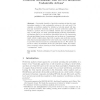Free Online Productivity Tools
i2Speak
i2Symbol
i2OCR
iTex2Img
iWeb2Print
iWeb2Shot
i2Type
iPdf2Split
iPdf2Merge
i2Bopomofo
i2Arabic
i2Style
i2Image
i2PDF
iLatex2Rtf
Sci2ools
104
Voted
WINE
2009
Springer
2009
Springer
Prediction Mechanisms That Do Not Incentivize Undesirable Actions
A potential downside of prediction markets is that they may incentivize agents to take undesirable actions in the real world. For example, a prediction market for whether a terrorist attack will happen may incentivize terrorism, and an in-house prediction market for whether a product will be successfully released may incentivize sabotage. In this paper, we study principal-aligned prediction mechanisms– mechanisms that do not incentivize undesirable actions. We characterize all principal-aligned proper scoring rules, and we show an “overpayment” result, which roughly states that with n agents, any prediction mechanism that is principal-aligned will, in the worst case, require the principal to pay Θ(n) times as much as a mechanism that is not. We extend our model to allow uncertainties about the principal’s utility and restrictions on agents’ actions, showing a richer characterization and a similar “overpayment” result. Key words: Prediction Markets, Proper Scoring Rules, ...
Related Content
| Added | 25 May 2010 |
| Updated | 25 May 2010 |
| Type | Conference |
| Year | 2009 |
| Where | WINE |
| Authors | Peng Shi, Vincent Conitzer, Mingyu Guo |
Comments (0)

